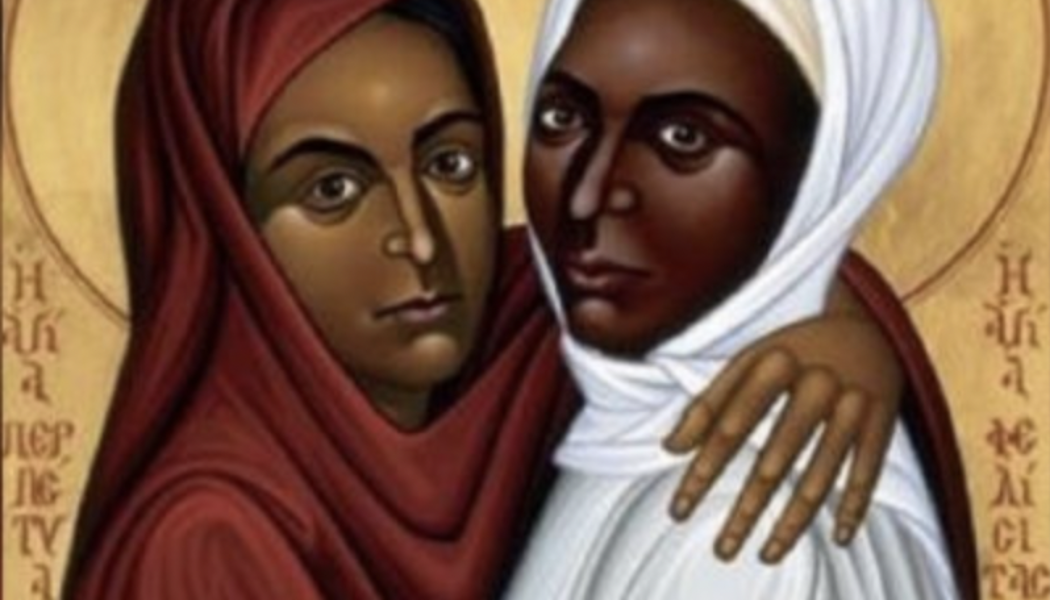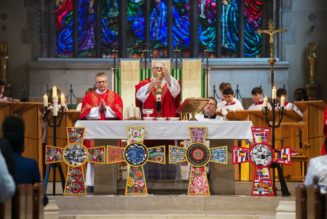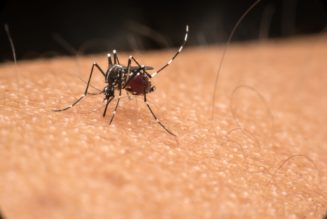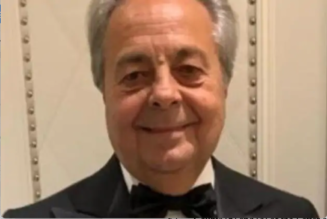Hey everybody,
Today is the memorial of Sts. Perpetua and Felicity, and you’re reading The Tuesday Pillar Post.
You know their names from the litany of saints. But do you know their stories?
They were Christian martyrs put to death together in North Africa in the early third century, during a persecution ordered by the Emperor Severus.
Both were 21 years old or so.
One, Perpetua, was a noblewoman and a nursing mother when she was put into prison for refusing to renounce Christ, just after she was baptized.
The other, Felicity, was a slave, who gave birth in prison to a baby girl in prison, just days before she was martyred.
They are the patronesses of mothers and expectant mothers.
May they intercede today for all mothers in need of prayer.
The news
The pope did not reappoint some existing members of the group, including Cardinal Reinhard Marx, the controversial Archbishop of Munich and Friesing. Marx was previously president of the German bishops’ conference, which has been at loggerheads with the Vatican over the German “synodal path,” as well as German plans for a permanent “synodal council” which would, in the German view of things, exercise some governing authority over the Church in Germany.
Two cardinals who were not reappointed were well past the typical retirement age for bishops, while two other members past retirement age, Cardinals Oswald Gracias and Sean O’Malley, were reappointed for another term.
Hollerich is a senior leader for the Church’s synod on synodality, and has made headlines for 2021 remarks in which he said the “sociological-scientific foundation” of the Church’s teaching on homosexuality is “no longer correct.”
The cardinal called for a fundamental revision of Catholic doctrine on sexuality, even while he has insisted that he has “no personal agenda” for the synod on synodality, at which he will be the general rapporteur of the global synod meeting in October, and thus charged with writing the final report submitted to Pope Francis.
What does it mean that he was appointed to the Council of Cardinals? Who can say? Pope Francis has already demonstrated his trust in Hollerich, given the big role in the synod he’s tasked to play. So this move hardly comes as a surprise, but it will be controversial, given Hollerich’s comments on doctrine.
At the same time, there are questions these days about how Pope Francis is really using the Council of Cardinals — Ed raised those in December. While the pope has seemingly not tasked the group with much in recent meetings, that may change with new faces in the room.
If you want to read more about Hollerich himself, here’s a profile Luke wrote last year.
And if you want to read about the new appointments to the C9, you can do that here.
Current leases can continue, but will not be renewed, except on terms likely to charge several times the current rents.
The Vatican, as you probably know, is reportedly broke.
And while the numbers aren’t available yet, Vatican officials have said that 2022 and 2023 would be “particularly difficult” years which would “not allow us to be very cheerful.”
Truth be told, changing the amount of rent charged to cardinals and archbishops working in the Vatican is not likely to make too much of a difference for the big fiscal shortfalls the Apostolic See is facing.

One Free Summer Audit! Take one online course for free ($355 value) on topics like the Legacy and Thought of Joseph Ratzinger/Benedict XVI; Biblical Studies; the Song of Songs; and American Saints and Blesseds. We hope you’ll join us! Application deadline for Summer Session I is April 28th. See full list of courses here.
We began reporting in January on allegations of sexual harassment and misconduct leveled against recently laicized priest Frank Pavone, who remains head of Priests for Life, a large and influential advocacy group.
We have reported on two women who made in 2009 reports to Pavone’s former diocese – Amarillo, Texas – about serious misconduct toward subordinates, while other women say they saw “red flags” or “grooming behavior” during their employment at Priests for Life.
Well, the next chapter is this: The Diocese of Amarillo says that in 2010, after at least two women reported serious misconduct, Pavone and other Priests for Life officials were made to undergo sexual harassment training.
The women say that’s not enough — they claim that their allegations were not taken seriously by the Amarillo diocese, and not investigated. They also lament that Pavone was assigned to live in a monastery of sisters after accusations that he harassed, groped, and manipulated young women — and they raise concern that the Amarillo diocese did not give them any information about what happened after their complaints.
The diocese only acknowledged the harassment training, they note, after The Pillar’s public reports, and only by a letter to one of the women.
Amarillo’s handling of the Pavone allegations raises good questions about how dioceses have handled the mistreatment of adults, including subordinates, by clerics — and whether much has changed on that front in recent years.
You can read about all of that here.
—
We reported this morning that the leaders of several national pro-life organizations have withdrawn from the 115 Forum, a mostly-confidential alliance of pro-life advocates and organizations coordinated by Pavone and Priests for Life.
Some of them told us that the allegations against Pavone have caused a major rift among pro-life leaders, as they debate how they should respond to the allegations against the priest.
That rift, some say, will become a defining moment for what it means to be pro-life advocates in America.
Here’s how one leader put it:
“Sadly, we are divided. There are some who are standing by Frank, no matter what. And some of the ways they try to justify that is by dismissing the concerns that were raised by these women who say that Frank mistreated them. I think that is really disappointing.”
“We are supposed to be a pro-woman movement. Women need to know that they can count on us. And yet these very credible allegations of sexual misconduct – which I believe are true – are being dismissed with the flimsiest excuses, with comparisons to Christine Blasey Ford, or with claims that the timing is suspicious.”
…
“But I guess for me, the idea that the entire world would see the pro-life movement being silent on this — or offering nothing but support to a guy who’s been stripped of his priesthood and accused very credibly of sexual misconduct, well, I think that’s a really bad look for the pro-life movement.”
So which pro-life groups have distanced themselves from Pavone? And what happens next?
You can read about it here. And I hope you will.
(And if I may, I’d like to preempt a question I know we’ll get in the comments: Why is The Pillar still reporting on Pavone? We get that question every time we report on Pavone, for what it’s worth, mostly from the former priest’s supporters. So I’ll answer with another question: Why aren’t more news outlets reporting on Pavone? Here’s the facts — the head of a major pro-life organization, purportedly for priests, has in recent months been both laicized and accused of serious and serial misconduct. He remains the head of that major pro-life organization, and an influential pro-life leader, despite the allegations that he has treated women, frequently, with profound disrespect. That seems precisely the kind of news that those interested in the reform and renewal of the Church and her life should be interested in.)
‘Perfect in love, gentle and kind’
I have been thinking recently about data released last month from the CDC, which indicates the profundity of a mental health crisis among American teenagers, especially girls.
In research conducted by the CDC, 57% of teenage girls said they felt persistent sadness in 2021 — a 60% increase since 2021.
Thirty percent of teenage girls said they have seriously considered committing suicide, and almost 13% said they had attempted it.
Boys are also struggling, the research found, but depression rates were found to be twice as high among girls as among boys.
To be sure, the pandemic had something to do with that. But so does social media, and especially the negative messages girls encounter on platforms like Instagram and TikTok, where impossible body and self-image standards are set, and where negative mental health effects are pretty well-documented.
Some analysts have suggested that the spike in depression, anxiety, and other struggles for teen girls coincides with the emergence of the forward-facing cellphone camera, by which users could post photos of themselves easily, and which has transformed a great deal about social interaction.
We have a social media problem, and much of it falls on teenage girls, who hear regularly a message that they’re not good enough, in any number of ways.
I’ve been thinking – and talking with friends – about how that coincides with what happened at Asbury University last month, down in Wilmore, Kentucky.
Most people have heard about the Asbury Revival, a movement which began at a chapel service at a Methodist university. A midweek prayer service began Feb. 8, and just didn’t end, for weeks. Students stuck around in the university auditorium after the morning service, praying with each other and singing praise songs. Kids came and went, but the praise and prayer continued — for days.
People began to hear about this, and showed up, in buses and vans. The university allowed the prayer to continue. Students remained the leaders. Celebrity preachers and professional Christians were turned away when they showed up for a moment in the spotlight.
The whole thing continued, organically, for two weeks — just Christians praying together and for each other, and with each other, all with the sense that the Holy Spirit was moving.

Now, we’re Catholic, and some of you are skeptical about things like this. But for my part, I know that the Holy Spirit moves in Christians who are not in the full communion of the Church.
And I am struck by how all of this began. In the midst of a national crisis for young people – and epidemic of perceiving that they’re not good enough, or that they won’t be loved, consider what Zach Meerkreebs, a local pastor, preached at that chapel service:
“Some of you guys have experienced radically poor love,” Meerkreebs told the students.
“Some of you guys have experienced that love in the church. Maybe it’s not violent, maybe it’s not molestation, it’s not taken advantage of—but it feels like someone has pulled a fast one on you.”
Then he offered the invitation that ignited a movement: “If you need to hear the voice of God—the Father in Heaven who will never love you that way, that is perfect in love, gentle and kind—you come up here and experience his love. Don’t waste this opportunity.”
Meerkreebs told those kids that God the Father has a better love for them than what they’ve experienced in our world, in our culture. And even while he thought the sermon was a “stinker,” it resonated. It resonated enough to move students in the Holy Spirit, and to see a kind of outpouring of praise.
There’s something there worth considering. The Father “is perfect in love, gentle and kind.”
Those of us who are struggling need to know that. We need to hear and experience it. And so does an American population which, the data says, is really not doing well. It does not strike me as an accident that a message of divine and perfect love struck a chord with people who are conditioned to measure themselves by impossible standards.
To the social media message of inadequacy, and the addictive search for validation through likes — engineered to hardwire into our brains — comes the Father’s love, “gentle and kind.”
Praise God for that. May more of us know it, believe it, and be transformed by it.
—
We’re grateful for you, Pillar readers. May we love the Church well together, and may we be witnesses of the Father’s love.
Be assured of our prayers, and please pray for us.
We need it.
In Christ,
JD Flynn
editor-in-chief
The Pillar

One Free Summer Audit! Take one online course for free ($355 value) on topics like the Legacy and Thought of Joseph Ratzinger/Benedict XVI; Biblical Studies; the Song of Songs; and American Saints and Blesseds. We hope you’ll join us! Application deadline for Summer Session I is April 28th. See full list of courses here.









